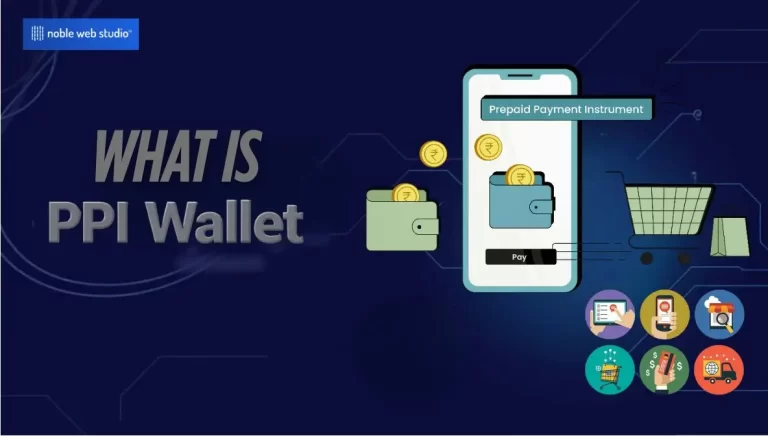In today’s digital economy, almost everything from shopping online to paying utility bills requires money in some form, whether directly or indirectly. Gone are the days when cash was the only mode of transaction. With rapid advancements in financial technology, digital payments have taken center stage, offering convenience, speed, and security.
One of the most widely used forms of digital payment today is the PPI Wallet, also known as a Prepaid Payment Instrument. These wallets allow users to load a certain amount of money and use it for various transactions like mobile recharges, bill payments, ticket bookings, and even offline purchases at supported merchants.
If you’re wondering “What is a PPI Wallet?”, “How does a prepaid payment instrument work?”, or “Which is the best PPI wallet in India?”, this blog will answer all your questions in detail.
Before we dive deep into how PPI wallets work and their benefits, let’s take a quick look at how payment systems have evolved over time.
What is a PPI Wallets? The Importance and Types of PPI Wallets
A Prepaid Payment Instrument (PPI) wallet, often referred to as a PPI wallet, is a type of digital or physical wallet that lets users store funds for various transactions. Instead of linking directly to a bank account, users load money into the wallet and can then use the stored funds to pay for goods, services, or even transfer money. It’s like having a prepaid card, where you have control over the balance, and can use it for different financial activities without the need for a traditional bank account.
With a PPI Wallet, you can add a fixed amount of money and use it as needed just like a prepaid debit card. This makes them especially useful for managing daily expenses, sending money, and making cashless transactions without needing to carry cash or even open your banking app.
Types of PPI Wallets
PPI wallets are divided into three main types: closed, semi-closed, and open. Closed PPI wallets are used only within a specific company or service, limiting their use to that brand’s ecosystem. Semi-closed wallets are more flexible, allowing payments at a select group of merchants within a network. Open PPI wallets are the most versatile, letting users make transactions across multiple platforms and merchants.
1. Closed System PPIs:
Closed System PPIs are wallets that can only be used within a specific company’s network. For example, gift cards or travel cards are often limited to certain stores or particular uses. These wallets are easy to use for customers within the set system and can help businesses advertise and promote their products or services.
2. Semi-Closed System PPIs:
Semi-closed PPIs strike a balance between limited and open usage. These wallets can be used at various merchants that are part of the issuing company’s network. Examples include mobile wallets like Paytm or PhonePe, which can be used at many online and offline stores. They offer more flexibility than closed wallets but still keep some control over where they can be used.
3. Open System PPIs:
Open PPIs are highly flexible and widely accepted, meaning they can be used at many merchants for various transactions. Examples include debit or credit cards, which can be used for both online and offline shopping, as well as withdrawing cash. These wallets offer the most convenience, allowing users to spend their prepaid funds on a wide range of needs.
In summary:
Open: Widely accepted and can be used across various platforms.
Closed: Restricted to a specific company or entity.
Semi-closed: Limited to a network of affiliated merchants.
Features of PPI Wallets
PPI wallets offer a simple and flexible way to make digital payments. They come with pre-loaded funds, various usage options, and the ability to work across different platforms. They also provide features such as UPI integration, dispute resolution, security, and bill management.
Here’s a closer look at the features:
Convenience and Flexibility:
- Pre-loaded Funds: PPI wallets allow users to load a specific amount of money, which can be used for different transactions.
- Variety of Usages: These wallets can be used for buying goods and services, online shopping, paying bills, and even sending money abroad.
- Interoperability: Users can make payments at any point-of-sale (POS) terminal that accepts digital payments, and transfer funds between different PPI wallets.
- Bill Management: Many wallets come with features for managing and paying recurring bills.
- Self-registration: Users can easily register and manage their accounts through the wallet’s platform.
- Rewards and Discounts: Some wallets offer cashback, rewards, and discounts to encourage frequent use.
Security and Reliability:
- Secure Authentication: PPI wallets use strong authentication methods to protect user data and prevent unauthorized access.
- Dispute Resolution: If a transaction issue arises, PPI wallets provide options for resolving disputes.
- Security: PPIs come with features like transaction monitoring and fraud prevention to ensure the safety of funds.
Cross-border Remittances: Many PPI wallets support international money transfers, making it easier to send and receive money across borders.
Other Notable Features:
Subscription Management: Users can pay for subscriptions using PPI wallets, without needing to link their bank accounts.
UPI Integration: Many PPI wallets are integrated with the Unified Payments Interface (UPI), enabling smooth transactions across various platforms.
Financial Inclusion: PPI wallets contribute to financial inclusion by offering digital payment options to those who may not have access to traditional banking services.
Budget-friendly Solutions: These wallets help users manage their spending by allowing them to set limits on the funds available.
How to Use PPI Wallets: Step-by-Step Guide for Digital Payments
A Prepaid Payment Instrument (PPI) wallet, similar to a digital wallet, lets you store money electronically for various transactions. To use it, you first load funds into the wallet from a bank account, credit or debit card, or other available methods. Once the wallet is loaded, you can use the stored money for online or offline purchases, transferring funds, and in some cases, even withdrawing cash, depending on the wallet’s features and rules.
Here’s a more detailed breakdown of how PPI wallets work:
1. Loading Funds:
- Various Methods: You can add money to your PPI wallet through bank transfers, debit or credit cards, or other accepted payment methods.
- Limits: There are usually limits on how much you can load at once and the total balance you can hold, as set by the Reserve Bank of India (RBI).
2. Making Transactions:
- Online and Offline Purchases: PPI wallets allow you to make payments at online and offline merchants who accept them.
- Point of Sale (POS) Acceptance: You can use your wallet at POS terminals to pay for goods and services.
- Interoperability: Some PPI wallets can be used across different merchants and allow fund transfers between different wallets.
3. Transfers and Withdrawals:
- Transfer to Other Wallets or Bank Accounts: Depending on the wallet, you may be able to transfer funds to other PPI wallets or even bank accounts.
- Cash Withdrawal: Some wallets allow you to withdraw cash from ATMs or POS machines, though there are usually limits on the withdrawal amount per transaction.
4. Monitoring and Tracking:
- Balance and Transaction History: You can regularly check your wallet balance and view transaction history to monitor your spending.
Important Considerations:
- KYC Requirements: You may need to provide Know Your Customer (KYC) details when opening and using a PPI wallet, particularly for wallets with higher transaction limits.
- RBI Regulations: PPI wallets are subject to regulations set by the RBI, so it’s important to be aware of the specific limits and rules associated with them.
Top Benefits of Using PPI Wallets
In today’s digital-first world, PPI wallets (Prepaid Payment Instruments) have become a convenient and secure alternative to traditional cash and bank transactions. Here are the most important benefits of using PPI wallets, especially for users seeking speed, security, and ease of use in financial activities:
1. Easy and Instant Access to Digital Payments
- PPI wallets offer seamless transactions for peer-to-peer transfers, online shopping, and retail store payments.
- With biometric or PIN-based authentication, users enjoy fast and secure payments without the need to visit ATMs.
- You can easily use your digital wallet app to pay utility bills, recharge your mobile phone, or book services online in just a few taps.
2. Simplified Financial Management and Rewards
- PPI wallets provide real-time expense tracking and a detailed transaction history, making budgeting easier than ever.
- Many wallets offer cashback rewards, loyalty programs, and exclusive discounts, enhancing the overall value of every transaction.
- Unlike traditional bank accounts, most PPI wallets don’t require a minimum balance, making them user-friendly and cost-effective.
3. Enhanced Security and Spending Control
- With features like multi-factor authentication, real-time alerts, and end-to-end encryption, PPI wallets ensure high-level security.
- Users can set spending limits, helping them manage finances and prevent overspending.
- In case of device loss or unauthorized access, limited user liability policies offer peace of mind and protection from large financial losses.
4. Financial Inclusion and Broader Accessibility
- PPI wallets promote financial inclusion by offering services to individuals who may not have access to traditional banking systems.
- Thanks to widespread mobile internet access, users in remote or rural areas can now participate in the digital economy.
- These tools support economic empowerment and improve financial literacy for underserved populations.
Read Blog : Starting a Money Transfer Business: Everything You Need to Know
Most Popular PPI Wallets in India: Trusted Digital Payment Apps for Secure Transactions
Looking for the best PPI wallets in India to manage digital payments securely and efficiently? Here’s a curated list of the top mobile wallet apps that are widely used for everyday transactions, recharges, utility payments, and more.
1. Paytm
Paytm is one of the most trusted and widely used PPI wallets in India. It offers a complete suite of services including online shopping, bill payments, cinema ticket booking, metro card recharge, and mobile recharges. With strong security features and QR-based payments, it remains a favorite among users.
2. PhonePe
Backed by Flipkart, PhonePe is a highly popular digital wallet and UPI payment app. It provides a secure and intuitive platform for money transfers, recharges, bill payments, and online purchases, all directly linked to your bank account or wallet balance.
3. Google Pay
Google Pay enables users to make quick and easy UPI-based payments, money transfers, and bill payments. Integrated with your bank account, debit card, or credit card, it functions as a seamless PPI wallet solution for day-to-day transactions across India.
4. MobiKwik
MobiKwik is another leading PPI wallet offering fast and secure payments for utility bills, online shopping, insurance premiums, credit card payments, and mobile recharges. It also supports loan services, and users can earn rewards and cashback on regular usage.
5. Amazon Pay
Integrated within the Amazon ecosystem, Amazon Pay allows users to pay for online purchases, electricity and water bills, mobile/DTH recharges, and more. It’s a reliable PPI wallet especially favored by regular Amazon shoppers.
6. FreeCharge
FreeCharge is a simple and efficient PPI wallet known for its user-friendly interface and swift transaction processing. Users can pay for electricity bills, book train tickets, do mobile top-ups, and also access offers and discounts across multiple partner platforms.
7. Axis Pay
Offered by Axis Bank, Axis Pay is a secure and convenient PPI wallet app designed for quick UPI transfers, bill payments, and recharges. It combines bank-level security with ease of use, making it a solid choice for both Axis and non-Axis account holders.
Top Business Benefits of Using PPI Wallets
Using PPI (Prepaid Payment Instrument) wallets offers businesses several advantages, such as faster payments, increased sales, lower transaction costs, enhanced security, customer loyalty, and better financial management. PPI wallets also allow businesses to serve a broader customer base, including those who prefer digital payments and those without traditional bank accounts.
Here’s a closer look at the benefits:
- Easy Integration with E-commerce and POS Systems:
PPI wallets can be easily integrated with e-commerce platforms and point-of-sale (POS) systems, simplifying the process of accepting digital payments and making business operations more efficient. - Faster Payments and Improved Customer Satisfaction:
PPI wallets enable instant transactions, reducing wait times and improving customer experience. This is especially helpful for businesses like e-commerce and retail, where fast payment processing is crucial. - Increased Sales and Broader Customer Reach:
By accepting PPI wallets, businesses can attract more customers, particularly those who prefer digital payments. This opens up a larger market and can boost sales, especially with tech-savvy consumers. - Reduced Transaction Costs and Better Financial Management:
Using PPI wallets helps businesses save on cash handling, banking fees, and other costs tied to traditional payment methods. These wallets also offer real-time transaction tracking, which helps with cash flow management and financial planning. - Better Security and Reduced Fraud Risk:
Transactions through PPI wallets are encrypted and verified, which lowers the risk of fraud and theft. This is particularly important for online businesses, where security is a top priority. - Customer Loyalty and Engagement:
Businesses can offer loyalty programs, cashback, and other rewards through PPI wallets. This encourages customers to return and helps strengthen business relationships. - Flexibility and Convenience:
PPI wallets can be used for both online and offline purchases, providing customers with a simple and accessible way to make payments. - Financial Inclusion and Accessibility:
PPI wallets enable businesses to reach customers who don’t have traditional bank accounts. This promotes financial inclusion and provides more people with access to digital payment options.
Read Blog : What is Domestic Money Transfer in India? A Complete Guide
NobleWebStudio’s PPI Wallet Solutions
NobleWebStudio offers innovative PPI wallet solutions designed to meet the needs of both businesses and consumers in 2025. With features such as:
- Multi-currency support
- Secure payment processing
- Seamless integrations with other fintech services
- User-friendly interfaces
NobleWebStudio’s PPI wallets ensure that users can make payments with confidence, whether for personal use or business transactions.
Read Blog : Cash Management System API: Complete Guide for 2025
Future of PPI Wallets
The future of Prepaid Payment Instruments (PPI) wallets in India looks promising, especially after the recent RBI regulation allowing full-KYC PPIs to connect with UPI (Unified Payments Interface). This move is set to enhance the interoperability of PPI wallets, making them more accessible and user-friendly. By enabling these wallets to be linked with traditional bank accounts, this regulation aims to boost financial inclusion and promote the growth of digital payments in India. As more people adopt digital payment methods, PPI wallets will play a crucial role in simplifying transactions and expanding access to financial services.
Conclusion: Embracing the Future of PPI Wallets
PPI wallets, which have revolutionized India’s financial landscape, offer users unmatched convenience and flexibility. These wallets provide a range of unique features tailored to diverse needs, making digital transactions seamless and efficient. As India moves towards sustainable and eco-friendly financial solutions, PPI wallets are playing a crucial role in promoting green financing. With continuous advancements, PPI wallets are rapidly transforming into comprehensive financial ecosystems, paving the way for a more secure, inclusive, and accessible digital financial future.
By partnering with trusted providers like NobleWebStudio, businesses can ensure they offer the most reliable and secure PPI wallet services to their customers, paving the way for smoother, faster, and safer financial transactions.
FAQs About PPI Wallet
Ans. A PPI (Prepaid Payment Instrument) Wallet is a digital wallet that allows users to store money digitally and make online and offline payments without using cash or cards. It’s a convenient, secure, and RBI-regulated payment method widely used for recharges, bill payments, shopping, and peer-to-peer transfers.
Ans. A PPI Wallet works by allowing customers to load money into their wallet using bank transfers, debit cards, credit cards, or UPI. This stored value can then be used to pay merchants, transfer funds, or purchase services online or offline, depending on the wallet type and RBI regulations.
Ans. In India, there are three main types of PPI Wallets:
Closed PPI Wallets: Issued by a single merchant for buying goods/services from that merchant only.
Semi-Closed PPI Wallets: Can be used at multiple merchant locations partnered with the wallet issuer.
Open PPI Wallets: Issued by banks, allowing cash withdrawals, fund transfers, and payments at any merchant accepting card-based or digital payments.
Ans. Yes, PPI Wallets in India are regulated by the Reserve Bank of India (RBI), ensuring strict security protocols like KYC verification, transaction limits, and encrypted payment gateways, making them a safe option for digital payments.
Ans. While both store money, a PPI Wallet is designed for faster, small-value digital payments and doesn’t offer services like interest on deposits, cheque issuance, or loans. It serves as a prepaid instrument for convenient online and offline transactions.
Ans. As per the latest RBI guidelines in 2025, a full KYC-compliant PPI Wallet can hold up to ₹2,00,000, while minimum KYC wallets have a monthly load limit of ₹10,000, with specific usage and withdrawal limitations.
Ans. Businesses can streamline their payment collections, offer customer cashback, loyalty rewards, simplify refunds, and enable instant payment options by integrating a secure PPI Wallet API from trusted fintech providers like NobleWebStudio.
Ans. You can partner with a reliable PPI Wallet development company like NobleWebStudio, which offers end-to-end, RBI-compliant wallet software solutions tailored to your business model, along with integration support and secure transaction management.
Ans. Yes, Paytm is a popular PPI wallet that offers various services like mobile recharges, bill payments, and online shopping.
Ans. PPI stands for Prepaid Payment Instrument, a financial product used to make payments.





